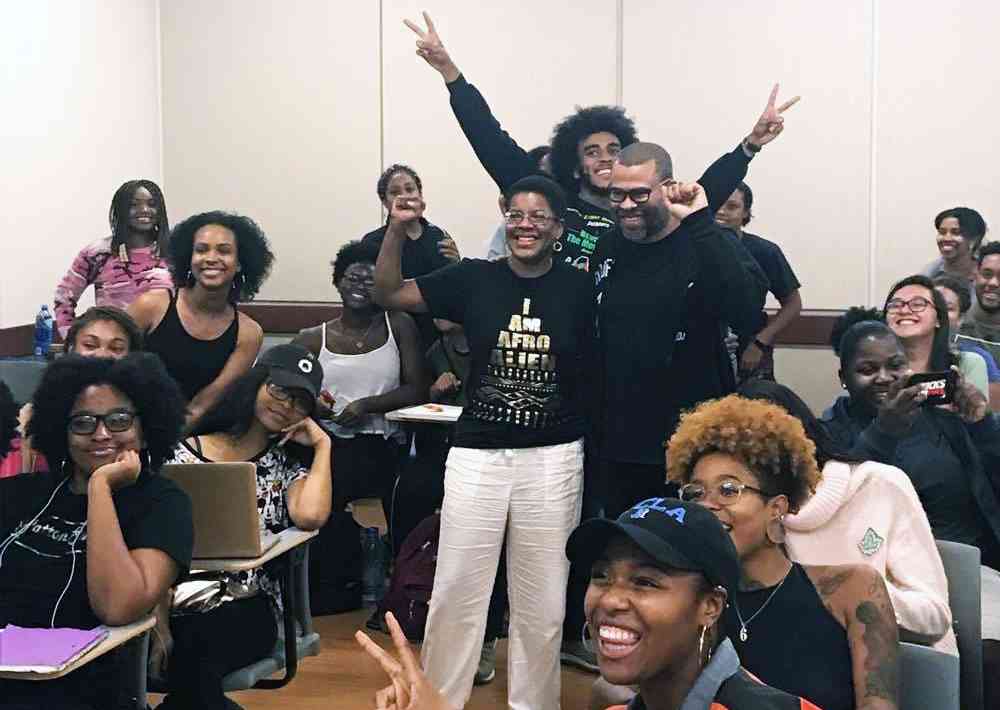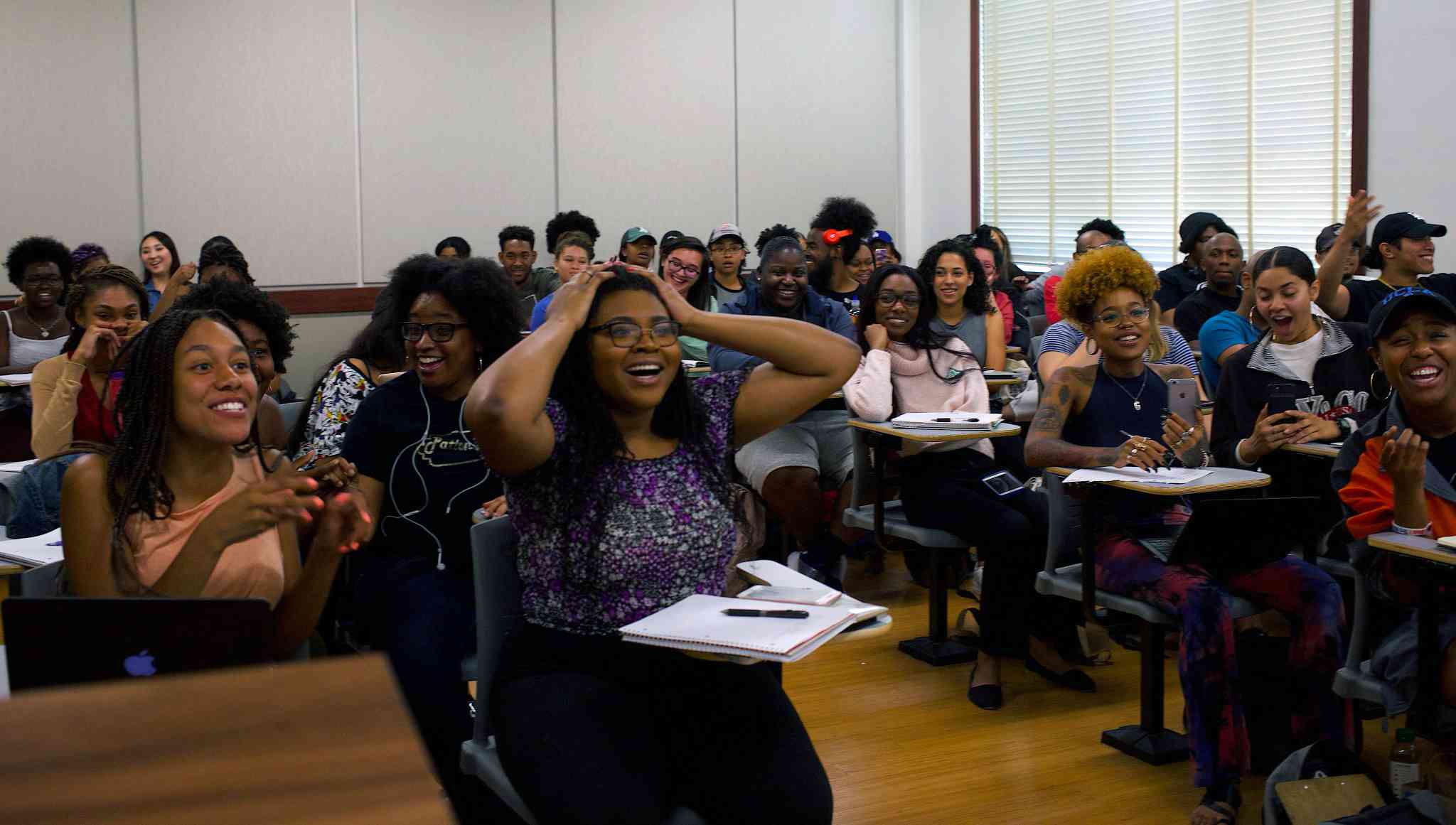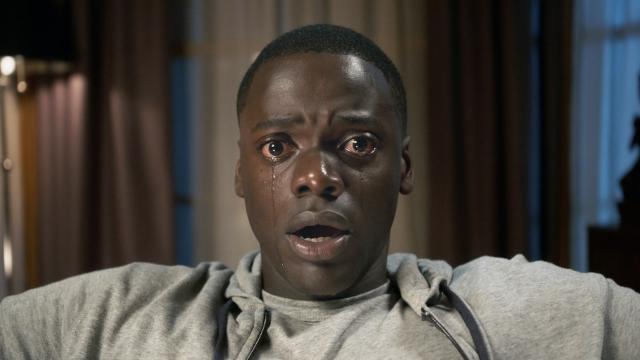Last year, dozens of lucky students got to take “The Sunken Place: Racism, Survival, and Black Horror Aesthetic”, a UCLA course on black horror, inspired by Jordan Peele’s hit movie Get Out. This month saw the debut of a web seminar on the same subject, offered by Prof Tananarive Due and her husband, author Steven Barnes.
Image: Universal
When I spoke to Due and Barnes on Skype two weeks ago, they said that the idea for the Sunken Place webinar came from the overwhelming response to the UCLA course. “The highest number I’ve ever had in [my] Afrofuturism [class] was about 30. And that was a lot of students,” said Due. “I had 60 in my first quarter for Sunken Place, and I have 60 again. They have given us a bigger room, in fact.”
The media coverage of the class, Due explained, led to many students who wanted to take the class, but couldn’t get in (even before they knew Peele himself would stop by). “So now, it’s crazy and so many people have said, ‘Oh, I wish I could take that class,’” she continued. “And we teach classes through webinar, and have for years, and it’s just suddenly like, ‘Well, wait a minute – why don’t we just offer this class online?’

Image: MonkeyPaw Productions
As Due mentioned, Peele did wind up showing up to her course after it debuted last spring, in a surprise appearance that made students go crazy.
Shoutout to @JordanPeele for coming to my Black Horror Aesthetic class and lecturing us on his movie #GetOut ✊???? pic.twitter.com/P9P7aRGoV3
— DJ ODYSSEY (@Dj_Odyssey_) October 12, 2017
The act of sneaking Peele in involved showing his movie. “The way I kept them distracted before sneaking Jordan into the room was showing the clip where Rose says, ‘You know I can’t give you these keys, babe,’” says Due. “That scene where you realise he has no allies in the house? They had had an extensive discussion about that – and the messaging in the film around the complicity of white women – in the previous class. So, I knew if I put that clip on, we could have an earthquake and they wouldn’t notice.”
Barnes, who was there as well, chimed in with more details: “There were two doors. And we snuck him in through the back door, we had a seat reserved for him, but he’s wearing the hoodie and a baseball cap and he’s kind of hunched down.”
“After I brought the lights up, I said, ‘OK – what did you think the director was trying to say about the coveting of black bodies?’” Due continued. “And he raises his hand in the back, and he’s like, ‘I have a question.’ And he stood up, walked to the front of the room, and the class, in waves, just went crazy.”

Image: MonkeyPaw Productions
“One student ran out of the classroom, sobbing,” Barnes said. Says Due, “I was like, ‘Where is she going?’ And she was just going to the hall to walk it off and get herself re-centred so she could come back. And what was fantastic about it, was that I really got the sense that it wasn’t just ‘Jordan Peele from Key & Peele‘ kind of love he was getting. It was ‘this is the creator of this masterwork we have been studying’. I mean, they totally got that.”
In a similar way, Get Out‘s impact has rippled all over the world in the months since its release. “There are conversations that are happening now in 2018 concerning race that have never been happening in the history of this country, thanks to Get Out,” Barnes observed. “There is an opening for artists right now. If you’re willing to speak a dangerous truth, and you’ve got the skill to do it right, there is real opportunity.”
Part of why Get Out resonates so much is because it gets at what’s been called America’s birth defect, which is to say the slave trade and its legacies. “Politics are the way you actualise or mobilise philosophy. You know, the question – the core questions of philosophy are, ‘Who am I?’, ‘What is true?’, and ‘What is the basic nature of mankind?’” Barnes offers. “And in race in America, the basic question was, ‘Who are we? What are we?’ In other words, does nature trump nurture? Does essence precede existence?”
“Slavery was based upon the assumption of inferiority,” he continued. “The emancipation did not say black people were equal. The emancipation said we should not treat these poor people this badly. We’re still dealing with that question of inferiority. I think that up until 1970, and the Voting Rights Act, we were not even full citizens in America. That was when the conversation really began to turn towards, ‘Are we actually equal? What are the implications of that?’ and, ‘How much guilt do we need to feel as a nation about the way they have been treated if they’re actually equal?’”
“What Get Out does,” Due said, “is allegorically document white supremacy and its effects on black Americans. It’s from slavery – metaphorically, you can look at that – Jordan Peele talked about the sunken place about being an interpretation of mass incarceration. But I think you can also extrapolate slavery. The theft of black bodies for labour. In this case, it was the theft of black bodies just to enhance their lives.”
It’s important to note that though Due is still teaching it, the online version of the course is not affiliated with UCLA – and there are no exams or graded essays, either. “There is homework that we will expect students to keep up with,” she says, “but why take the class if you’re not going to do the homework, right?” Homework largely consists of watching a roster of films. “Instead of one film a week, like I had my UCLA students do, online they will be doing more like two films a week,” she notes. The reading portion is mostly made up of short stories. “It’s an overview course, where the lynchpin is Get Out. Because Get Out – not only because of its success – gives us a common point of conversation, and encompasses to much of what I call the black horror aesthetic. Which is using that allegory as a way of processing everything from slavery, to white supremacy and whatever racialised trauma.”
I talked to Due and Barnes weeks ago, after Get Out got shut out at the 2018 Golden Globes, and asked them I asked them what they thought the prospects of an Oscar nomination were. They were optimistic and they also ended up being right:
Tananarive Due: I really believe very strongly that Get Out will get, not one, but at least a couple Oscar nominations. I would be shocked if it doesn’t get a Best Original Screenplay.
Steven Barnes: I would say that that’s pretty close to a lock.
Due: And aside from that, there’s talk of Best Picture. There’s talk of Daniel Kaluuya as Best Lead Actor. So there may be some other nominations. I don’t know how to explain exactly what happened at the Golden Globes. First of all, let me preface it this way – I don’t know how significant the Golden Globes are as a forecast of the Oscars. I’m sure it’s helpful. And I know it probably can’t hurt. But the voting base is so different. I mean – can you really think its more important when you look at Writers Guild Awards, and stuff like that?
But having said that, I’m sure everyone would have loved it if the film had won, or if Daniel Kaluuya had won. Um… it’s tough. Their categorisation process is awkward? So that might be some of it. I saw a lot of people obviously will assume it’s sort of a racial shut out, because people don’t want to look at the things that Get Out put out in people’s faces. There may be some truth to that. Or maybe an aversion to even seeing the film, because you can see from the trailer, “Oh, this might make me uncomfortable.” You know? In fact, I think I said that to someone at a party.
Barnes: I think its possible to look at it in at least two different ways – one is simply the practical way of how a single film doesn’t give us enough data to know whether or not it’s lost. But it’s also possible to look into the framework of a history of films of certain political points of view being excluded or discounted. Or psychologically, black people understand that movie on a different level. Actually, there was one guy who was just going on, “whoever did this movie has no idea about race relations in America”. You know? Just a white guy who thinks he understands what he doesn’t understand. The Dunning-Kruger effect. Ignorance masquerading as wisdom. That we get what Jordan Peele was doing to the point where, whatever qualities are in that film, it is lifted up by our understanding of the truth that is being given to us. It’s like we look at this movie, and “Oh my God,” someone is speaking the unspeakable. This isn’t a joke.
Due: Someone said it. But this also the thing – besides the racial possible handicap – it’s also a horror film. And as someone tweeted… I wish I could cite the tweet I saw earlier… where some guy was saying, “Oh, those of you who are upset about Get Out being shut out of the Oscars, welcome to being a horror fan.” So there are a lot of people who will not take horror films seriously.
(Get Out received four nominations: Best Picture, Best Director, Best Original Screenplay and Best Actor. The Oscars are on March 5.)
Elaborating on the specifics of the online seminar, Due says they’re hoping to get Peele and Candyman lead actor Tony Todd to appear as they did in the UCLA class. “But it’s more lecture and discussion-based than special guest-based at this point,” Due says. “It’s mostly lectures and deep dives into the themes of not only Get Out, but also Candyman, Ganja and Hess – that movie’s take on the vampire mythos – and Beloved.”
When asked who might be the ideal people to take the Sunken Place seminar, Barnes singled out three populations. “One is just the fans who want to understand and have a wider context and deeper understanding of the roots of horror, black horror in America, and our transition from being the monsters in Birth of a Nation to being the ones who fight the monsters. That’s an amazing, heroic journey that we have taken in this country,” he began. “We also want to be a resource for teachers of black horror to provide them with context, to deepen them, so that they can in turn reach out and touch other people. But also, we want to impact the next generation of the creators of black horror.”
“We all stand on giants,” Barnes said. “But someone like Jordan Peele has created very broad shoulders, indeed. And so if we understand what he has done – and what some of these other people have done, like what Tony Todd says about the way he approached the acting in Candyman, and what this means to him – it changes things. You’re no longer looking at the surface of the question, now you’re looking underneath. You’re popping up the hood and looking at the actual engine that makes that car work. Most people are just looking at the finish, the colour, the paint. Let’s look at the power train. How this works. Why this works. How this can be something that is a transformative experience, culturally. That’s different.”
“I really do think horror is significant socially, period, and has a way of providing a lens that few other kinds of art can,” said Due. “Black horror in particular is especially powerful that way. And I want to spread it like a virus. One of the things that was most exciting to me about the UCLA course was that I gave my students the opportunity to write either an essay, or a short story, or make a short film. And in the past, I’ve never had anyone make a film. A few people have written stories. This past year, I got several stories. I got two excellent films. And it just showed me, when you open that door of enlightenment and teach students how to take the feelings that they already have, but express them through horror, boom, we’re ready to go.”
Due said she and Barnes want to help create artists. “That’s a big part of what we want to do, and who we are. So, while it’s more of an academically-oriented course, I hope that through that better intellectual understanding of the material, it will help artists open up their imaginations about how they can take their truth – like Jordan Peele took his truth – and create art with social impact.”
To find out how to register for the “The Sunken Place” web seminar, go here.
